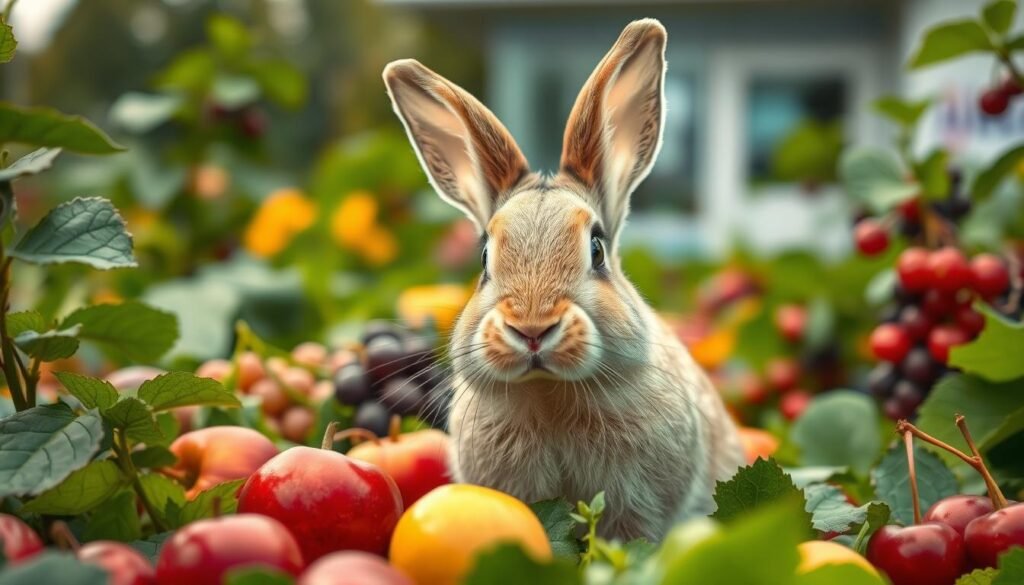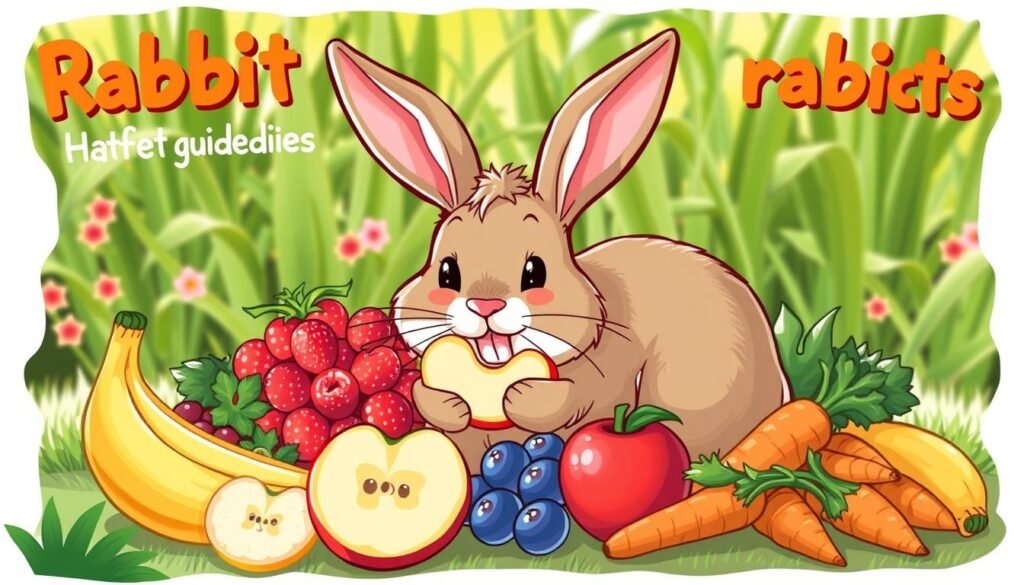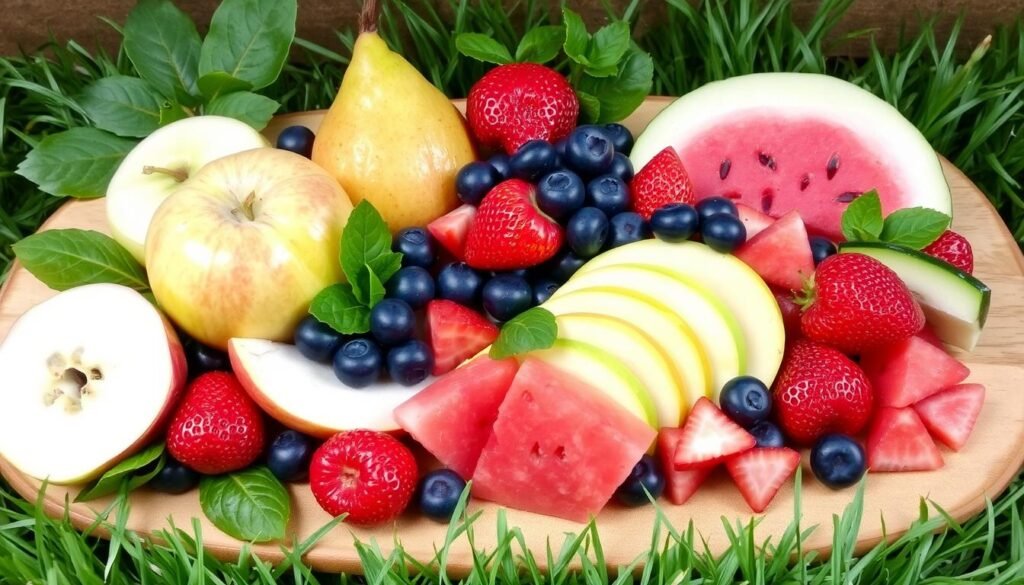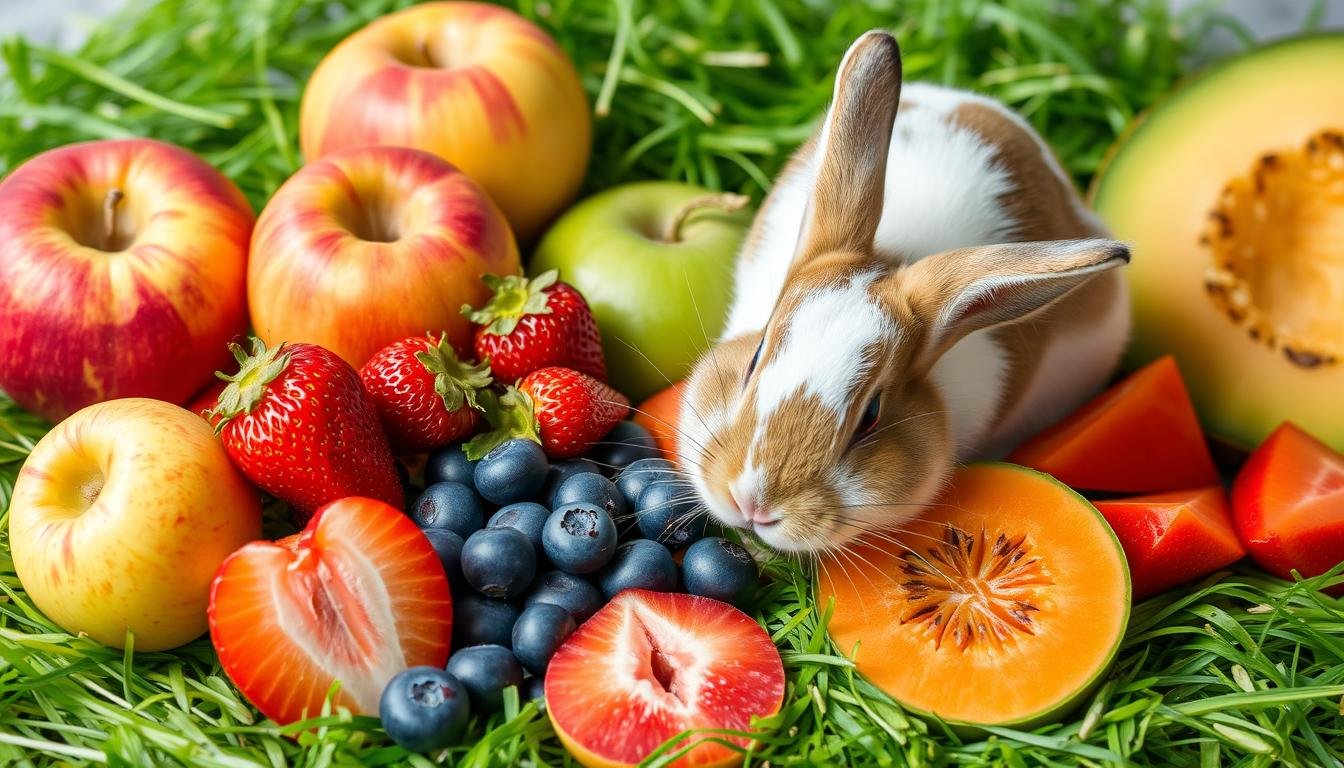As a rabbit owner, I’ve often wondered what fruits are safe for my furry friend to eat. Apples are a popular fruit, but can rabbits eat them? My research shows that a rabbit’s diet should include high-quality hay, limited pellets, and fresh veggies. Fruits like apples can be given as treats, but only in small amounts1.
This balance is key for a healthy rabbit diet. Fresh hay, like Timothy Hay, is essential and should always be available1. Adding rabbit-safe fruits, including apples, can be a great way to enrich their diet. But, it’s important to know about apple nutrition and the risks involved.
Rabbits are better at handling cold than heat, thanks to their thick fur coat2. But, cold weather can still pose risks like hypothermia and respiratory issues2. A balanced diet, including fruits like apples, is crucial for their health and happiness. During the COVID-19 pandemic, rabbit sales skyrocketed by 212% compared to the year before3.
This surge in rabbit adoptions highlights the need to understand their care and nutrition. Knowing how to incorporate fruits like apples into their diet is essential.
Key Takeaways
- A rabbit’s diet should consist of high-quality hay, limited pellets, and fresh vegetables, with fruits like apples given as occasional treats in moderation1.
- Fresh hay, such as Timothy Hay, is a staple food source and should be provided unlimited access throughout the year1.
- Rabbits naturally tolerate cold better than heat, having a thicker fur coat that protects them from winter conditions2.
- A well-balanced rabbit diet, including rabbit-safe fruits like apples, is vital for their overall health and well-being.
- During the COVID-19 pandemic, rabbit sales increased by 212% compared to the previous year, surpassing both cat and dog adoptions3.
- Understanding apple nutrition and the potential risks is crucial for maintaining a balanced rabbit diet.
- Rabbit-safe fruits, including apples, can be a great addition to their diet, but it’s essential to introduce them in moderation1.
Understanding Your Rabbit’s Natural Diet
To care for our rabbits well, we must know their natural diet. In the wild, rabbits eat plants like grasses, leaves, and fruits. Their digestive system is made for plant foods, fitting them perfectly to their environment4. They mainly eat high-fiber foods like timothy hay, which helps them stay warm in winter4.
Good rabbit nutrition is key for their health. A balanced diet includes hay, pellets, and fresh veggies. Fruits like apples and strawberries are treats because of their sugar4. Though fruits play a small part, they offer important vitamins and minerals. Also, about 60% of rabbits eat less in winter because they’re less active5.
Here are some key points to consider when it comes to a rabbit’s natural diet:
- High-quality hay should make up the bulk of their diet
- Fresh vegetables and fruits should be given in moderation
- Pellets should be limited to avoid obesity
- Access to fresh water is essential, even in cold weather4
By understanding the wild rabbit diet and nutrition, we can give our pets a balanced diet. The role of fruits is important but should be limited to avoid digestive problems5.
It’s also key to watch our rabbit’s health and adjust their diet as needed. Regular health checks can spot issues like weight changes or frostbite4. With a balanced diet and proper care, our rabbits can thrive and live happy, healthy lives.
Can Rabbits Eat Apples? The Simple Answer
As a rabbit owner, knowing about apple safety and its effects on rabbit health is key. The question of whether can rabbits eat apples is common. The answer is yes, but with some care. Apples are a nutritious fruit that can give your rabbit important vitamins and minerals6.
But, it’s important to take out the seeds, leaves, and stems. They have a toxic compound called amygdalin that can release cyanide, a harmful substance6. Apple pieces should not make up more than 10% of a rabbit’s daily food because of their sugar7. It’s best to give apples as treats, a few times a week, not as a main part of their diet6.
Here are some key points to consider when feeding apples to your rabbit:
- Remove seeds, leaves, and stems to ensure apple safety
- Limit apple intake to 10% of daily calories7
- Provide apples as a treat, not as a staple in the diet6
- Choose fresh, washed apples to prevent digestive upset6
By following these guidelines, you can help keep your rabbit healthy. Always remember to prioritize can rabbits eat apples safety and moderation when adding new foods6.
Health Benefits of Apples for Rabbits
As a rabbit owner, it’s key to know how apples can help your pet. Apples are full of vitamins A and C, potassium, and fiber. These nutrients make apples a great choice for your rabbit’s diet8. The fiber in apples aids in digestion, and the vitamins and minerals are vital for health.
Apples are packed with fiber, offering over 5 grams in one apple8. This fiber is good for digestion and prevents constipation. Apples also have antioxidants, which protect cells and lower disease risks.
Vitamin Content
Apples are rich in vitamins A and C. These vitamins are key for healthy skin, eyes, and immune function. Vitamin A is good for vision, and vitamin C boosts the immune system and fights infections9.
Fiber Benefits
The fiber in apples is great for a rabbit’s digestion. It prevents constipation and reduces digestive disorder risks. A fiber-rich diet also supports healthy gut bacteria, which is vital for a strong immune system10.
Adding apples to your rabbit’s diet offers many health benefits. They support digestion, boost the immune system, and provide essential nutrients. With their fiber and vitamins, apples are a nutritious and tasty treat for rabbits8.
Potential Risks and Concerns
Feeding apples to rabbits comes with some risks. The seeds, leaves, and stems have amygdalin, which can release cyanide. This is a toxic substance11. Too much apple can also cause digestive problems like diarrhea and stomach upset11. It’s key to remember that rabbits need a balanced diet. They should eat mostly hay and grass, making up 85% of their food11.
Some plants, like Field Horsetail, have a lot of silica. This helps with dental health but can wear down teeth12. But, plants like Bracken are toxic to rabbits and should be avoided12. It’s also important to slowly introduce new fruits. This helps watch for any digestive issues. Make sure fruits and veggies don’t make up more than 10% of their diet11.
To avoid risks with apples for rabbits, do the following:
- Remove seeds, leaves, and stems from the apples
- Introduce apples gradually and in small amounts
- Monitor for digestive issues and adjust the diet as needed

Knowing the risks and taking steps to avoid them can help keep your rabbit healthy and happy. They can enjoy apples as an occasional treat11.
| Rabbit Health Risks | Apple Toxicity | Digestive Issues |
|---|---|---|
| Seeds, leaves, and stems contain amygdalin | Can release cyanide, a toxic substance | Overfeeding apples can lead to diarrhea and stomach upset |
How to Prepare Apples for Your Rabbit
When preparing apples for your rabbit, food safety is key. It’s important to wash and clean the apples well13. Also, remove the seeds, leaves, and stems because they have a toxic compound called amygdalin. This makes apple preparation safe and healthy for your rabbit.
Using the right cutting techniques is also crucial to avoid choking. Cut the apple into small pieces and consider removing the core for easier digestion. Rabbits can have 1-2 tablespoons of fruit as treats because of the sugar content13. By following these steps, you can add rabbit-safe treats to your rabbit’s diet.
Always put food safety first when preparing apples for your rabbit. With the right apple preparation and a balanced diet, your rabbit can enjoy rabbit-safe treats and stay healthy and happy13.
Serving Sizes and Frequency Guidelines
Feeding apples to rabbits needs careful attention to their health. The amount and how often to give apples depends on their age, size, and health. A good starting point is 1-2 tablespoons of apple per 2 pounds of body weight per day14. This helps avoid overfeeding and keeps their diet balanced.
Figuring out the right apple serving sizes for your rabbit involves considering their activity level and needs. For instance, a more active rabbit might need more frequent feedings. On the other hand, a less active rabbit might require less. Watching your rabbit’s weight is also key to prevent obesity and health problems.
Having a plan for treat frequency is crucial for a balanced diet. Apples should be treats, not a main part of their diet. It’s wise to limit treats to 10% of their daily calories14. This way, you can keep your rabbit healthy and content.

Every rabbit is unique, and their diet needs can differ. Always talk to a vet for specific advice on rabbit feeding guidelines and apple serving sizes. This ensures your rabbit gets the best care15.
Signs Your Rabbit Enjoys Apples
As a rabbit owner, it’s key to know when your rabbit likes their apple treat. One clear sign is the crunching sound they make while eating apples. This shows they’re really enjoying their snack16. Also, if they’re happy and relaxed, it means they love their apple snack15.
Other signs include licking their lips, sniffing the air, or playing with their favorite toy. These actions show they love apples and enjoy their treats16. To make treat time fun for your rabbit, try these tips:
- Give them different apple slices to keep them interested and happy15.
- Make sure they have a quiet, comfy spot to enjoy their treat without distractions16.
- Watch how they eat and adjust the amount to avoid overeating, which can harm their health16.
By noticing these signs and following these tips, you can make apple treats a fun and positive experience for your rabbit. This can help them enjoy apples even more15.
Remember, every rabbit is different. So, it’s important to watch and understand what your rabbit likes and needs when it comes to treats and apples16.
Other Safe Fruits for Rabbits
As a rabbit owner, it’s key to know many fruits are safe for them. In summer, rabbits can enjoy berries, melons, and citrus fruits17. These fruits are tasty and give rabbits important nutrients and water.
In winter, rabbits might need more hay to stay warm. But they can still have some fruits like apples and bananas in small amounts18. Remember, fruits should only make up 2% of a rabbit’s daily food17. Berries like blackberries, blueberries, and raspberries are also safe for rabbits, offering a variety of options17.
When adding new fruits to your rabbit’s diet, do it slowly and watch for any bad signs17. Fruits like papaya and pineapple are good for rabbits because they have digestive enzymes17. Always make sure your rabbit has fresh water and a balanced diet to keep them healthy and happy.

By adding different safe fruits to your rabbit’s diet, you can give them a tasty and nutritious treat. Always put your rabbit’s health first by introducing new foods slowly and watching how they react17.
My Personal Tips for Introducing New Fruits
When adding new fruits to your rabbit’s diet, start small and slow19. This helps avoid upset stomachs and lets you watch how your rabbit reacts. A healthy rabbit diet includes lots of hay, some pellets, and fresh fruits and veggies20.
Begin with a tiny bit of the new fruit and watch your rabbit’s response. If they like it and don’t get sick, you can give more21. But remember, fruits are sweet and can cause problems if eaten too much.
Here are some tips for adding new fruits to your rabbit’s diet:
- Start with small amounts and gradually increase the portion size
- Monitor your rabbit’s behavior and health for any signs of digestive upset
- Choose a variety of fruits to ensure a balanced diet
- Avoid giving too much fruit, as it can lead to digestive issues
By following these tips and introducing new fruits slowly, you can make the transition smooth for your rabbit. Always put your rabbit’s health first and talk to a vet if you’re worried19.
| Fruit | Recommended Amount | Frequency |
|---|---|---|
| Apples | 1-2 slices | 2-3 times a week |
| Bananas | 1/2 banana | 1-2 times a week |
| Strawberries | 1-2 strawberries | 2-3 times a week |
Conclusion: Making Apples a Safe Treat for Your Rabbit
Apples can be a healthy treat for rabbits if given the right way. Follow the tips in this article to give your rabbit a tasty and nutritious snack22. Remember, their diet should mainly be hay, veggies, and water. Fruits and sweets can upset their stomach if eaten too much22.
When adding apples or new fruits, do it slowly and in small amounts. Eating too many apples or sugary fruits can cause problems like digestive issues and obesity22. Always think about your rabbit’s health first and talk to a vet if you’re worried about their diet or health.
By choosing wisely and giving a balanced diet, apples and other safe fruits can be a fun and healthy part of their meals22. With some knowledge and care, your rabbit can enjoy apples and stay healthy and happy.

